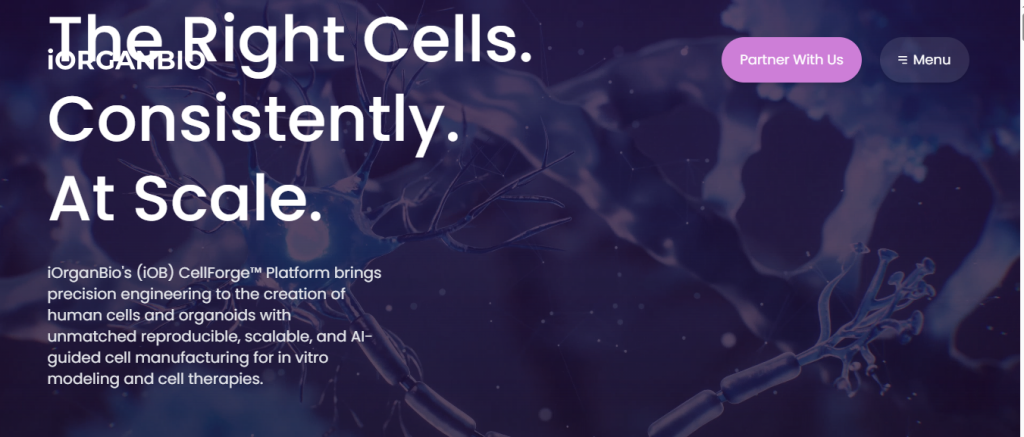IORGANBIO Raises $2,000,000 to Engineer Functional Human Organs in the Lab – No Donors Required
November 4, 2025
byFenoms Start-Ups

IORGANBIO, a biotech company pioneering the fabrication of full-scale, transplant-ready human organs from induced pluripotent stem cells (iPSCs), has raised $2,000,000 in its latest funding round. Investors include First Star Ventures, IndieBio, Cape Fear BioCapital, 2ndF, Terasaki Institute, and Alix Ventures. Led by CEO and founder Daniel Delubac, IORGANBIO isn’t trying to improve organ donation. It’s trying to eliminate it.
The company’s mission is staggering in ambition: create a reliable, on-demand supply of transplantable organs - engineered from a patient's own cells - to end donor shortages, organ rejection, and waitlist deaths. IORGANBIO combines cellular reprogramming, organoid engineering, scaffold design, and vascularization technology to produce human organs for therapeutic use and long-term disease modeling.
Every year, thousands of patients die waiting for an organ that never becomes available.
IORGANBIO is building a world where patients don’t wait. Organs do.
Reframing Transplant Medicine: From Scarcity to Unlimited Supply
Organ transplantation has always operated under one immutable constraint: there are more patients who need organs than organs available. Even when a compatible organ is found, immunosuppression - a lifetime of medication to prevent rejection - becomes a second battle. IORGANBIO changes this equation entirely. The company creates autologous organs using the patient’s own cells, eliminating rejection risk and removing the donor bottleneck.
Instead of searching for a donor match, physicians will order an organ like a therapy. Instead of competing for limited supply, patients will receive a precise biological replacement, engineered for compatibility. IORGANBIO doesn’t optimize the donor system.
It makes the donor system obsolete.
Infrastructure Over Invention: Building the Manufacturing Pipeline for Organs
Most synthetic organ companies focus on organoids - miniature tissue clusters that mimic organ function but cannot be transplanted. IORGANBIO takes the next step: scaling from organoids to full, vascularized, transplant-ready organs. The breakthrough isn’t in engineering the tissue - it’s in engineering the manufacturing system that makes scaling possible.
IORGANBIO combines:
• iPSC reprogramming
• Scaffold architecture and vascular channel design
• Multi-cell lineage differentiation
• Functional perfusion systems
Each organ is grown on a standardized, repeatable process - not built from scratch. The company is creating a playbook, not an experiment.
Other companies are researching how to build an organ.
IORGANBIO is building the system that manufactures organs at scale.
Don’t Build the Product. Build the Scarcity Killer.
Here’s where IORGANBIO gives founders a masterclass in positioning. Most startups create value by improving a process - faster, cheaper, better. Category creators eliminate the process entirely. Organ donation has rules, requirements, logistics, scarcity, waiting lists, and emotion. IORGANBIO removes every barrier by rebuilding the system from the ground up.
Industry incumbents optimize scarcity.
IORGANBIO ends scarcity.
This is how category kings are born:
They don’t compete with the old system.
They render the old system irrelevant.
Investor Confidence and Strategic Signal
This round includes a mix of deep-tech, biotech, and translational science investors. First Star Ventures and IndieBio have track records of backing frontier tech companies. Terasaki Institute and Alix Ventures bring translational research expertise and clinical access - essential for validation and early human trials. The presence of both venture investors and institutional biotech collaborators speaks to the dual path IORGANBIO is navigating: scientific rigor and commercialization readiness.
Investors aren’t backing a lab project.
They’re backing a future industry.
A Market That Needs a Revolution, Not an Iteration
Organ shortage is not a minor problem. It is one of the largest unsolved crises in healthcare:
- Over 100,000 patients in the U.S. are currently waiting for a life-saving organ.
- Every 9 minutes, another patient is added to the transplant waiting list.
- 17 people die every day waiting for an organ that never comes.
- Only 3 in 1,000 people die under conditions suitable for organ donation.
Even when a transplant happens, the real fight begins:
- Up to 25% of kidney recipients experience rejection.
- Immunosuppressive therapy increases cancer and infection risk long-term.
Demand is permanent. Supply is unstable.
This is not a supply chain problem.
It is a scarcity system problem.
IORGANBIO’s approach - patient-derived organs that eliminate rejection - turns the transplant model into a precision manufacturing model.
And the biotech industry is shifting accordingly:
- The global regenerative medicine market is projected to exceed $180 billion by 2030.
- The tissue engineering market is growing at a CAGR of 14–16%.
- The iPSC market alone is expected to reach $3.8 billion by 2027.
Biology is becoming programmable.
Organs are becoming manufacturable.
IORGANBIO is positioned at the intersection of inevitability and unmet need.
What’s Next for IORGANBIO
The company will use the funding to expand its organ manufacturing platform, optimize vascularization and maturation cycles, and move toward IND-enabling studies. Early priorities include kidney and liver - two of the most in-demand organs for transplantation and two of the most complex to engineer. The team is expanding partnerships with research hospitals and accelerating into preclinical safety validation.
IORGANBIO’s roadmap:
- Demonstrate fully vascularized organ-level function.
- Begin preclinical evaluation in large-animal models.
- Advance to early human trials.
IORGANBIO is not trying to win incremental innovation.
It is pioneering a new category of medicine.
Final Thoughts
This raise is more than capital. It is a declaration of where medicine is going. Transplant medicine has always depended on luck, scarcity, and tragedy. IORGANBIO replaces that paradigm with engineering, availability, and precision. In the same way insulin was once harvested from animals and is now manufactured, organs are about to follow the same trajectory.
The future of transplantation isn’t donation.
It’s fabrication.









